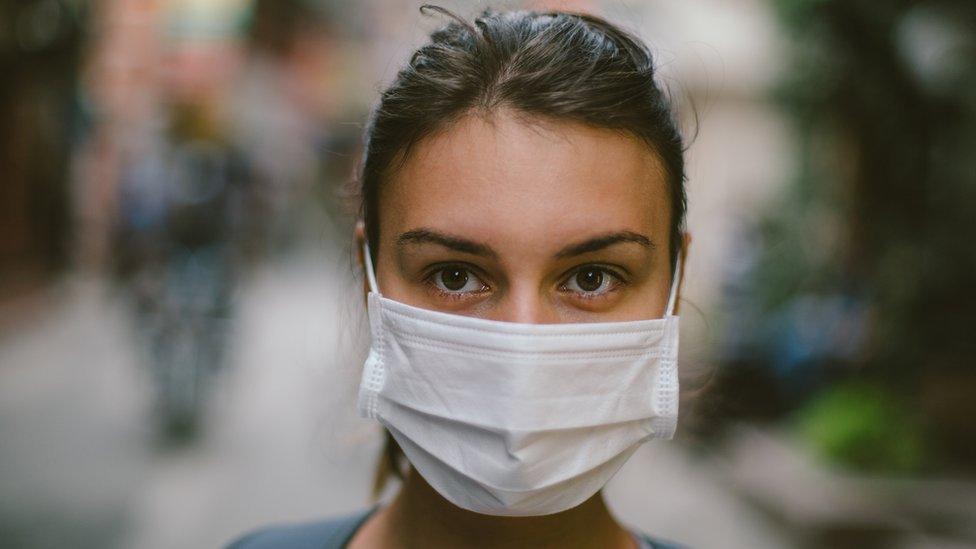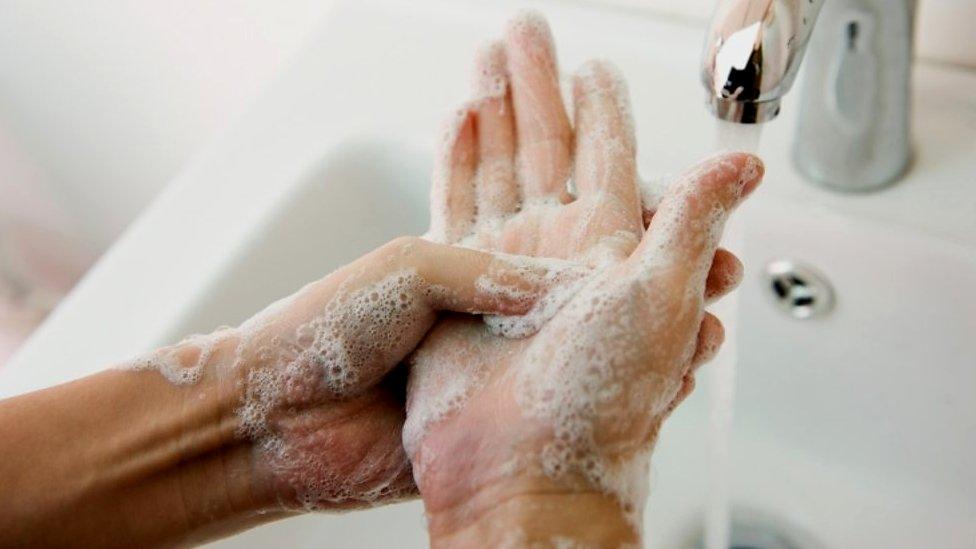Coronavirus: Warning of spike in scams linked to crisis
- Published

Fraudsters are reported to be selling counterfeit masks and hand sanitiser
Councils are warning people to beware of scammers pretending to be health officials or offering to pick up food and medicines.
Fraudsters are also selling counterfeit face masks and hand sanitisers, says the LGA, which speaks for councils in England and Wales.
Hand sanitiser containing an ingredient banned for human use six years ago has been seized in Birmingham.
The LGA is advising people not to accept help from cold-callers.
This means being suspicious of anyone who offers help, either online or in person, the Local Government Association warned, after councils in Rochdale and south London received reports of attempted scams.
In Lewisham, south London, Neighbourhood Watch reported cold-callers knocking at the doors of elderly people, saying they were from the health authority and were carrying out tests.

EASY STEPS: How to keep safe
A SIMPLE GUIDE: What are the symptoms?
CONTAINMENT: What it means to self-isolate
HEALTH MYTHS: The fake advice you should ignore
MAPS AND CHARTS: Visual guide to the outbreak
VIDEO: The 20-second hand wash

And in Rochdale, there were reports of strangers offering to run errands for elderly and vulnerable people amid fears they are trying to obtain Pin numbers and money by saying they will pick up shopping.
Others are trying to get into victims' houses.
People who are self-isolating are particularly at risk, says the LGA.
Genuine help
With residents across the UK organising help for vulnerable people, the Association says they will have the most impact by focusing on neighbours they know, making donations to food banks, or obtaining guidance from councils.
The advice to anyone without help to obtain food or medicines is to contact their local authority.
"By tricking elderly and vulnerable people in self-isolation to part with their cash, fraudsters are playing roulette with the lives of those most at risk," said Simon Blackburn, chairman of the LGA's communities board.
"Keeping the elderly and those with underlying health conditions safe is every council's top priority and councils will do everything in their power to prosecute fraudsters and seek the toughest penalties for criminals taking advantage in this despicable way," he added.
Action Fraud, which receives reports of fraudulent activity, says victims of online scams have lost £960,000 in 105 coronavirus-linked cases since the beginning of February.

This is likely to be the tip of the iceberg as many smaller cases are never reported.
Often they paid for mail-order sanitisation products which were never sent.
The National Fraud Intelligence Bureau says it has recorded 200 cases of fraudulent emails being sent, which include scammers who:
pretend to be from the US Centers for Disease Control and Prevention or World Health Organization, asking recipients to click a link to report active infections in their area
offer links to a fake daily newsletter for Covid-19 updates
offer fake insurance schemes and trading advice
pretend to be from the government, offering tax refunds
Trading standards officers in Birmingham have seized bottles of hand sanitiser containing an ingredient banned for human use years ago which were on sale for £5 a bottle.
They claimed to contain an ingredient called glutural, which was banned for human use by the EU in 2014.
Some bottles had no labelling at all.
Glutural can be used in cleaning products and has previously been used by the NHS to clean surgical tools and surfaces.